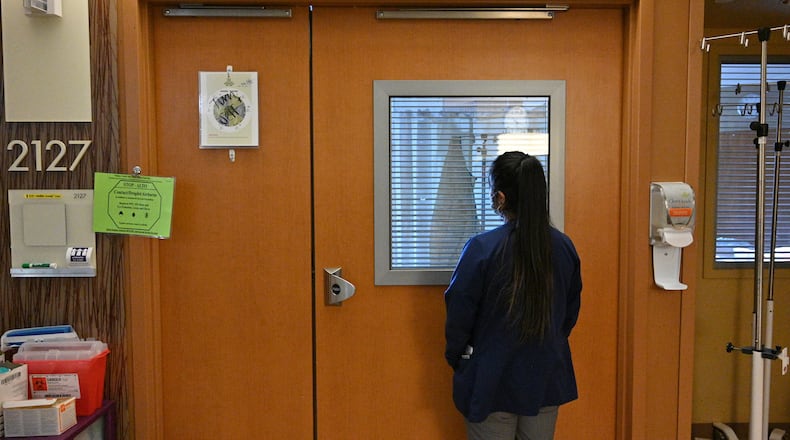The highly contagious omicron variant has pushed the daily average U.S. COVID-19 death toll higher than last fall’s delta wave as the nation nears a chilling milestone of 900,000 coronavirus deaths.
The average number of deaths reported each day in Georgia has been growing, too. But it remains unclear if Georgia will surpass the peak that followed the devastating surge of the earlier delta variant. Two health experts interviewed by The Atlanta Journal-Constitution Monday seemed divided on whether the state has yet to reach its peak number of deaths or if the death toll has already begun to wane.
The seven-day rolling average of confirmed and probable COVID-19 deaths on Monday in Georgia stood at 87 as measured by date of report. That’s about two-thirds of the way to the delta peak of 133 deaths by date of report, which was set in early October.
The seven-day rolling average of deaths reported in the U.S. during the delta surge peaked at about 2,100 in late September. The rolling average was 2,524 on Sunday, according to data from the New York Times.
Deaths are a lagging indicator of the coronavirus. Omicron is highly contagious, though it produces severe disease in a smaller percentage of overall infections compared to previous strains. Omicron was first detected in Georgia in early December.
Public health experts have warned omicron’s rapid spread make it a threat, bringing overwhelming patient loads to many hospitals across Georgia. Since the pandemic began, Georgia has reported 27,595 confirmed COVID-19 deaths and another 5,381 deemed probable for the disease.
As of Monday afternoon, 884,368 people in the U.S. had died of COVID-19, according to Johns Hopkins University data, with 74.3 million infected.
The 1 million deaths mark is likely on the horizon. Dr. Felipe Lobelo, an epidemiologist at Kaiser Permanente of Georgia, said official death counts are widely considered to be an undercount of the true toll, and the U.S. likely already surpassed that number.
“We all want this to be over,” said Lobelo about the pandemic. “But if you have 50 people dying in Georgia every day from COVID and close to 2,500 people in the U.S., obviously we are not done. And the fact that the bulk of these deaths could have been prevented by simply having three doses of the vaccine, that, to me is mind-boggling and upsetting but that is the reality.”
Omicron appears to generally cause less severe illness than previous variants especially for those who are vaccinated. But the number of people dying from omicron has been steadily rising over recent weeks because this variant is spreading rapidly and infecting such a large number of people.
The unvaccinated, immunocompromised and people with underlying comorbidities such as heart disease and diabetes remain especially vulnerable.
Here are key points about the increasing number of deaths in Georgia and a closer look at the trend line.
How the number of omicron deaths compares to delta wave.
There are two ways to look at deaths: deaths by the day they were reported and deaths by date of death.
The seven-day rolling average of deaths in Georgia by the day they were reported by the Georgia Department of Public Health stood at 87 on Wednesday.
Another way to look at deaths is by date of death. It takes time to verify deaths and when they occurred, and data in the most recent weeks is often incomplete. But through Jan. 17, the rolling average of confirmed and probable COVID-19 deaths by date of death is 50, or about one-third of the delta wave peak. But again, that data is likely to change in the weeks ahead.
Unclear if the number of COVID-19 deaths have peaked in Georgia. Amber Schmidtke, a public health researcher who tracks Georgia’s coronavirus epidemic in her widely read newsletter, said it is too soon to declare Georgia past its peak of deaths. It’s unclear how high the number of deaths might go in the state, but Schmidtke said it’s possible deaths could match those reported in the delta wave.
”I would not be surprised if we ultimately reach that point,” she said.
It often takes weeks between when someone becomes infected with the coronavirus, seeks hospital care, and ultimately succumbs to COVID-19.
The rolling average of new infections has come down about one-third from the most recent high on Jan. 11, though the descent has not been as quick as the rapid, record-breaking spike in new infections. Hospitalizations also are falling in Georgia, though they remain elevated.
”It’s always a sharp rise, a plateau and a more gradual decline,” Schmidtke said of deaths.
A new version of the omicron variant may extend the current wave of infections deaths
Lobelo said he believes while Georgia have may have peaked in terms of deaths from omicron, concerns remain about the impact of a new version of the omicron variant known as BA.2. The variant, which has been confirmed in the U.S. but not yet in Georgia, could drag out the omicron surge and lead to a much slower decline of the ongoing wave. According to the virus database GISAID, which scientists use to share sequenced coronavirus samples from around the world, fewer than 200 cases of BA.2 have been detected in the U.S.
Poll: Over half of Georgians remain concerned about the pandemic. Close to a third of Georgians – 29% are “very concerned” about another COVID-19 surge, according to a poll conducted for The Atlanta Journal-Constitution by the the University of Georgia’s School of Public and International Affairs Survey Research Center. Another 28.3% of Georgians are “somewhat concerned.” For the poll, 872 Georgians from across the state who are registered to vote were contacted. Results were released Thursday.
The Latest
Featured




